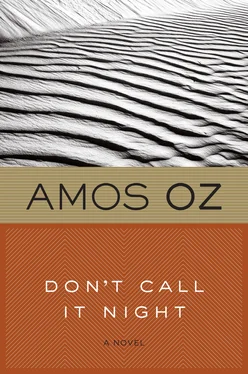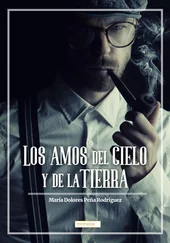Amos Oz - Don't Call It Night
Здесь есть возможность читать онлайн «Amos Oz - Don't Call It Night» весь текст электронной книги совершенно бесплатно (целиком полную версию без сокращений). В некоторых случаях можно слушать аудио, скачать через торрент в формате fb2 и присутствует краткое содержание. Год выпуска: 1997, Издательство: Mariner Books, Жанр: Современная проза, на английском языке. Описание произведения, (предисловие) а так же отзывы посетителей доступны на портале библиотеки ЛибКат.
- Название:Don't Call It Night
- Автор:
- Издательство:Mariner Books
- Жанр:
- Год:1997
- ISBN:нет данных
- Рейтинг книги:4 / 5. Голосов: 1
-
Избранное:Добавить в избранное
- Отзывы:
-
Ваша оценка:
- 80
- 1
- 2
- 3
- 4
- 5
Don't Call It Night: краткое содержание, описание и аннотация
Предлагаем к чтению аннотацию, описание, краткое содержание или предисловие (зависит от того, что написал сам автор книги «Don't Call It Night»). Если вы не нашли необходимую информацию о книге — напишите в комментариях, мы постараемся отыскать её.
Notable Book of the Year
“A rich symphony of humanity. . If Oz’s eye for detail is enviable, it is his magnanimity which raises him to the first rank of world authors.” —
(UK)
At Tel-Kedar, a settlement in the Negev desert, the longtime love affair between Theo, a sixty-year-old civil engineer, and Noa, a young schoolteacher, is slowly disintegrating. When a pupil dies under difficult circumstances, the couple and the entire town are thrown into turmoil. Amos Oz explores with brilliant insight the possibilities — and limits — of love and tolerance.
“Vivid, convincing, and haunting.” —
Don't Call It Night — читать онлайн бесплатно полную книгу (весь текст) целиком
Ниже представлен текст книги, разбитый по страницам. Система сохранения места последней прочитанной страницы, позволяет с удобством читать онлайн бесплатно книгу «Don't Call It Night», без необходимости каждый раз заново искать на чём Вы остановились. Поставьте закладку, и сможете в любой момент перейти на страницу, на которой закончили чтение.
Интервал:
Закладка:
As I got up to leave, on tiptoe so as not to disturb her; she stopped playing and said: One more thing, Theo. You've got to be in charge. It's got to be your baby. Be quiet, Mama. Drive carefully. And remember: I've promised you nothing.
19
MEANWHILE the summer is intensifying. The daylight oppresses us, murky and wearing, and even though the windows are closed tight, the powdery dust manages to get between my sheets. The asphalt road surface melts in the blast, and in the evening the walls release the residue of the heat. A southerly wind from over the hills brings a whiff of burning rubbish from the municipal dump, a sourish, scorched smell like a puff of bad breath. From the balcony I can sometimes see a Bedouin shepherd sprawled on the nearest hillside, a black figure among black goats, and the faint sound of his piping reaching me in broken snatches breeds peaceful detachment. What is he dreaming of, lying there motionless for hours on end in the shade of a sloping mass of rock? Some day I'll go across and ask him. I'll trail him to the caves in the mountains to the place where they say there is a nocturnal smugglers' route between Sinai and Jordan.
My class 12 graduates have started to disperse. Some have been called up early, others are drifting around the town, racing their parents' cars along the deserted streets. Or prowling backwards and forwards in groups across the square by the lights. Five of them turned up in Theo's office to ask his advice, not in his professional capacity but to do with their plans for backpacking in Latin America. There's a story going around in the town about him living alone among the Indians in the jungle for ten years. Some people call him Sombrero behind his back. Although everybody here keeps a respectful distance from him.
The battery and the oil pump of our rusty blue Chevrolet packed up within two days of one another. Jacques Ben Loulou from Ben Elul's Garage said, That's it, you should get rid of her. Theo screwed up his left eye, with a suspicious, peasant-like smile lurking in his grey moustache, and replied, What's the hurry? There's still some life in the old girl.
Some Tali or another came to see me one morning to show me some poems she'd written. She didn't know whether to call me miss or Noa. I was surprised because I didn't imagine that she or her friends would still be writing poems. I found the poems themselves thin, anemic, and I was looking for a way of saying so without hurting her.
Then I decided that I had no reason to discourage her: let her write. There was no harm in it. Who knew? Had Immanuel written poetry too? She had no idea. She didn't suppose so. But maybe he did actually — before he fell for that addict from Elat who taught him to sniff, he was in love with you up to here, so he might have written poems to you. With me? In love? What? Where did you get that idea from, Tali? Listen, Noa, first of all it's not Tali, it's Tal. Secondly, everyone knew. Knew? Knew what? How did they know? With an embarrassed, or perhaps disbelieving, smile on her lips: That's easy: it was written all over him. The whole class knew. What do you mean, did you really not notice, Noa? Seriously? Didn't you feel his love?
I said no. And I could see she didn't believe me. When she had gone I remembered the wall of the concrete apartment block, so close to the window of the boxed-in balcony that was his tiny bedroom in Aunt Elazara's apartment: a grey, dusty, depressing wall. And I remembered the brown mug. And his clothes. Folding the sweater. The torn blanket at the foot of his bed, where the mute dog slept at night. And the upside-down open book about the end of the Jews of Bialystok.
A couple of days later she turned up again, shy but excited, bringing me a new poem, and this time she agreed to have a cold Coke and some grapes with me on the balcony. She had written this poem under the inspiration she'd received from me the last time she came. She hoped she wasn't really bothering me. She found it quite tricky, this poetry thing, because she didn't have a lot of people she could show them to but on the other hand it is rather strange, isn't it, writing and writing and not showing them to anyone because there aren't a lot of people here to show them to. Apart from me, that is. She hopes it's not too heavy. Is she the only one in the class who tries to write poems? I dunno. I think so. We don't talk all that much. I mean, we talk lots, but not about that kind of thing. No way. So what do you talk about? All sorts of things. It's really hard to say. A bit about the army, about going abroad, about clothes and money, gossip, nothing special, this and that and that's it. Like on Friday evenings, after the disco, sometimes we get round to talking about what we're living for, there's this thing about the Far East and that, but that's just a few of us. Most don't. The boys are hooked on how to get into the real-action units, and what's cooler than what. Even though they're quite frightened about the army, and where it's screwing up most effectively — in the Territories or in South Lebanon, that sort of thing. Then there's the stuff about AIDS. We get to talk about that a bit too. And computers. And motorbikes.
I asked her about drugs. Tal said that they were actually quite in favour of this project, the refuge, that Muki Peleg and I were going to bring here. It'll be a real monument, so people will remember Immanuel, not like just any old pillar with a nameplate on it. We're all really keen on it. But most of the parents are jittery, they're nervous about the image of the town and property values and all that. I asked her if, so far as she knew, there was a real drug problem in the school. Well, it's like this. There aren't many real addicts, but there are one or two who have a smoke on Friday evening. Yes, she said, she had experimented herself, slightly, but so far she hadn't managed to get really high, because she always got a headache right away. There weren't a lot of real junkies. At least, not in the circles she moved in. Maybe down in the Josephtal Estate they snort a bit. It's hard to tell. What about Immanuel? Well, it's like this, more or less. At the beginning there was this thing in the Hanukkah break when some of the guys took off and hung around in Elat. He went back there a few times after that by himself, but nobody really knows what happened with that girl, Martha. There are stories going round. That's true. I don't know what really happened and I think that nobody really knows because Immanuel was so withdrawn. It got worse after he fell for you. Maybe there's someone that knows more than I do, but the thing is, actually I'm not so sure that anyone really truly knows anything about anybody. At all. In the whole world. How can you? Everyone's on their own private island. There's lots of gossip. That's true. There's stories going round about you too. And about Theo and Muki. And Linda. You must have heard them. People talk. No, I don't want to go into all that now. It's just irritating. Are you saying you truly never picked any of it up, Noa? Didn't you spot that he was in love with you? Nothing at all? Never mind. Nobody knows anything about anybody. Specially about love. Love is a really destructive condition, she said. Two strangers who suddenly see each other, or they don't really see each other, they smell each other, and in no time at all they get more attached to each other than a brother and sister. They start sleeping together in the same bed, even though they're not from the same family. And very often they're not even friends, they don't even know each other, they just get hooked on each other, and the rest of the world can go jump. Just look how destructive it is, really. More people probably die from love than from drugs. They ought to fix it so there's some way of treating that too. Every time she thought about how little one person knew about another she felt like laughing and crying. And the weirdest thing was that it was impossible to change it. It didn't make any difference how much you invested in somebody, you could invest a hundred years day and night without a break, you could sleep in the same bed as him, it didn't help, in the end you wouldn't know the first thing about him. If she had any more poems, could she keep coming? And anyway in a few days Nira was due to have her first litter of kittens, Nira was her cat, she was ginger, quite kittenish herself, really funny, had the mannerisms of a countess, but she was so aloof, even if everybody pleaded with her, made a fuss over her, adored her, it wouldn't make a bit of difference — with beautiful stripes like a tigress, she was so lovely, dreamy, and sometimes she sort of smiled, grinned to herself in a superior kind of way. And to let her parents have the kittens put down, it really upset her; so she thought maybe she could bring us a kitten as a present? After all, you haven't got any children, maybe your husband would say yes.
Читать дальшеИнтервал:
Закладка:
Похожие книги на «Don't Call It Night»
Представляем Вашему вниманию похожие книги на «Don't Call It Night» списком для выбора. Мы отобрали схожую по названию и смыслу литературу в надежде предоставить читателям больше вариантов отыскать новые, интересные, ещё непрочитанные произведения.
Обсуждение, отзывы о книге «Don't Call It Night» и просто собственные мнения читателей. Оставьте ваши комментарии, напишите, что Вы думаете о произведении, его смысле или главных героях. Укажите что конкретно понравилось, а что нет, и почему Вы так считаете.












